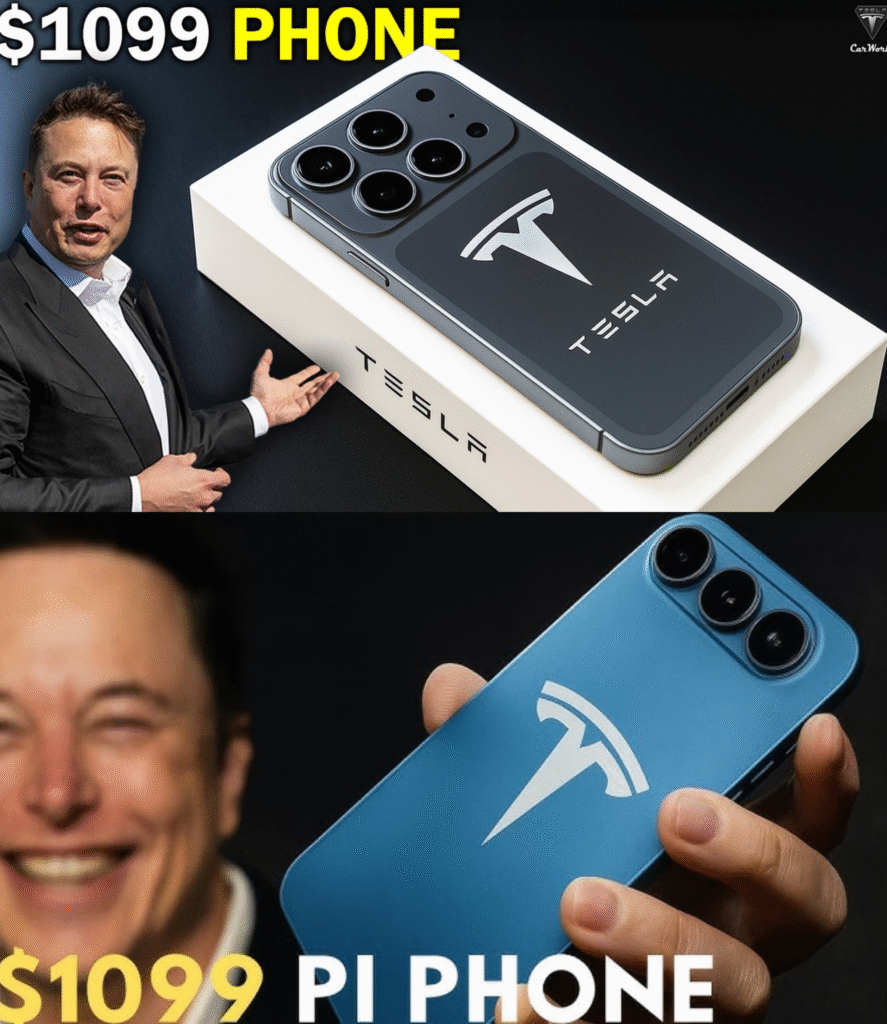
In what could be the most disruptive moment in smartphone history since the first iPhone launch in 2007, Elon Musk has officially unveiled the Tesla Pi Phone 2026, priced at $1,099 — and it’s already being called the “iPhone killer.” The long-awaited device promises to merge cutting-edge Tesla technology, AI integration, and Starlink satellite connectivity into a sleek, futuristic phone that redefines what “smart” really means.
For years, rumors about Tesla entering the smartphone market have circulated online. But now, it’s real — and according to experts, Apple’s dominance may finally be under threat.

The Reveal That Shook Silicon Valley
The grand reveal took place during a special Tesla Tech Summit held in Austin, Texas. Musk, in his usual unfiltered style, didn’t waste time throwing jabs at the competition.
“People deserve innovation that’s actually useful,” he said, as the crowd erupted in applause. “We’re not just giving you a phone. We’re giving you a tool that connects your brain, your car, and your planet.”
As lights dimmed and the first Pi Phone units appeared onstage, the room buzzed with disbelief. The phone’s design — minimalist yet distinctly Tesla — features a shimmering titanium finish, solar-charging surface, and no visible camera bump. Instead, Tesla uses a liquid-lens sensor that adapts dynamically, mimicking the human eye for unprecedented photo clarity.
Specs That Leave Apple Catching Up
The Tesla Pi Phone 2026 comes with features that make the iPhone 17 look dated overnight:
- Starlink Satellite Connectivity:
Users can stay connected anywhere on Earth — even in deserts, oceans, or mountain peaks — without relying on traditional cellular networks. - Solar-Charging Body:
The phone’s body is embedded with ultra-thin solar panels, capable of providing a full day’s power after just 30 minutes of sunlight. - Tesla Neural Sync:
A revolutionary feature that allows users to control their devices — or even a Tesla car — using thought-based commands through a built-in Neuralink-compatible interface. - AI Personal Assistant (Optimus OS):
The Pi Phone doesn’t just respond to your voice — it learns from you. Using Tesla’s AI engine, it anticipates your needs, automates your routine, and manages everything from smart homes to investments. - Astro Mode Camera:
Designed for astrophotography enthusiasts, the Pi Phone’s sensor automatically adjusts for cosmic light, enabling breathtaking photos of stars and planetary movements — even without professional gear.
Beyond a Phone — A Lifestyle Ecosystem
Tesla isn’t just launching a smartphone. It’s launching what analysts are calling a personal tech ecosystem.
Each Pi Phone seamlessly syncs with Tesla vehicles, Powerwalls, and Solar Roofs, allowing users to monitor energy production, car performance, and even home temperatures from one unified interface.
Imagine stepping out of your house as your Tesla unlocks itself, temperature adjusts, and your phone automatically uploads the day’s route — all powered by your personal solar energy grid.
This integration, according to Musk, is the future of “digital self-sufficiency.”
“We want you to own your data, your energy, your connection — everything,” Musk said during the keynote. “No more being trapped in the walled gardens of Big Tech.”
That line — “walled gardens of Big Tech” — was widely seen as a direct shot at Apple’s tightly controlled software and ecosystem.

Apple’s Dilemma: Can It Catch Up?
Industry analysts have long warned that Apple’s pace of innovation has slowed. The iPhone 17, though visually sleek, introduced mostly incremental updates — better cameras, faster chips, and new colors.
Meanwhile, Tesla is offering features that don’t even exist in Apple’s roadmap, including Starlink connectivity and off-grid energy capabilities.
Tech analyst Marissa Klein told CNBC,
“Apple may still dominate the luxury market, but Tesla is attacking from a completely different angle — autonomy. This isn’t just about phones; it’s about control over your digital life.”
Apple has yet to release an official statement on the Pi Phone launch, but insiders suggest that the company is “monitoring consumer response closely.”
Public Reaction: The Internet Can’t Stop Talking
Within hours of the announcement, “Tesla Pi Phone” became the #1 trending topic worldwide on X (formerly Twitter). YouTubers, influencers, and tech enthusiasts began flooding the internet with first-look reactions and teardown videos.
Early reviewers praised the build quality and intuitive software, describing it as “the perfect blend of Tesla’s industrial design and futuristic AI.”
One viral post captured the sentiment perfectly:
“Apple made us believe we needed luxury. Tesla made us believe we could own the future.”
Even long-time Apple loyalists are reconsidering their brand allegiance. “If this thing really connects to Starlink and charges on sunlight,” one Reddit user commented, “then why am I paying $1,200 for a phone that dies in 8 hours?”
The Starlink Advantage: Internet Without Boundaries
Perhaps the Pi Phone’s most transformative feature is its native Starlink integration. This effectively turns every Tesla phone into a self-sufficient internet node, independent of carriers like Verizon or AT&T.
In remote or disaster-stricken regions, this could revolutionize communication access — and Musk was quick to highlight its humanitarian implications.
“Imagine no more dead zones,” he said. “Imagine a world where anyone, anywhere, can connect — without permission.”
Experts believe this could force telecom companies to rethink their infrastructure models entirely.
Security, Privacy, and the End of Monthly Bills
In typical Tesla fashion, the Pi Phone is designed to eliminate middlemen. Users can store their data locally with end-to-end encryption and no third-party tracking.
And since connectivity comes from Starlink and power from the sun, many users will effectively have no recurring phone or data bills.
This concept of “almost-free living” aligns with Musk’s broader mission of technological independence, echoing his previous ventures like Tesla Energy and the $5,999 Tesla Tiny Home.

The Verdict: Disruption, Musk-Style
With the Tesla Pi Phone 2026, Elon Musk isn’t just entering the smartphone market — he’s rewriting it.
From its AI-powered OS to its energy autonomy, every inch of the Pi Phone screams innovation that Apple and Samsung have yet to match.
And while it remains to be seen how the device performs in long-term use, one thing is undeniable: the smartphone landscape will never be the same.
Musk concluded his presentation with a statement that sent ripples through the tech world:
“The future shouldn’t be controlled by corporations — it should be powered by people. The Tesla Pi Phone is just the beginning.”
As pre-orders flood in and tech enthusiasts line up across Tesla stores, one question lingers:
Has Elon Musk finally ended Apple’s reign? Or has he just sparked the next great tech war of our time?





